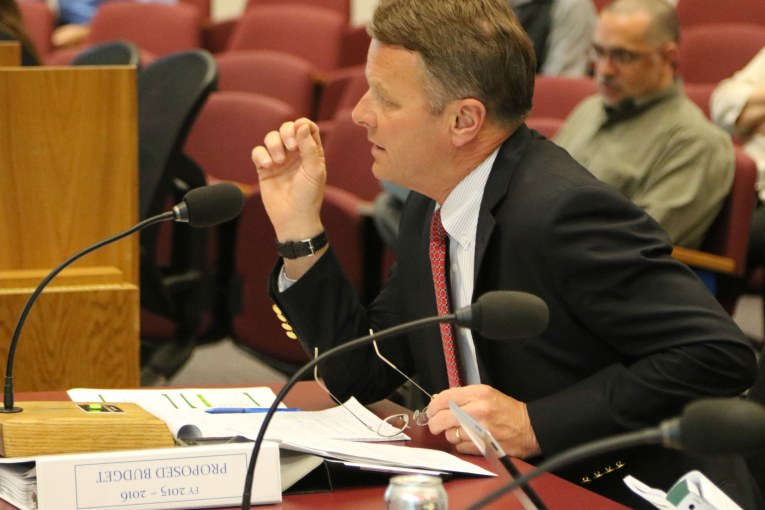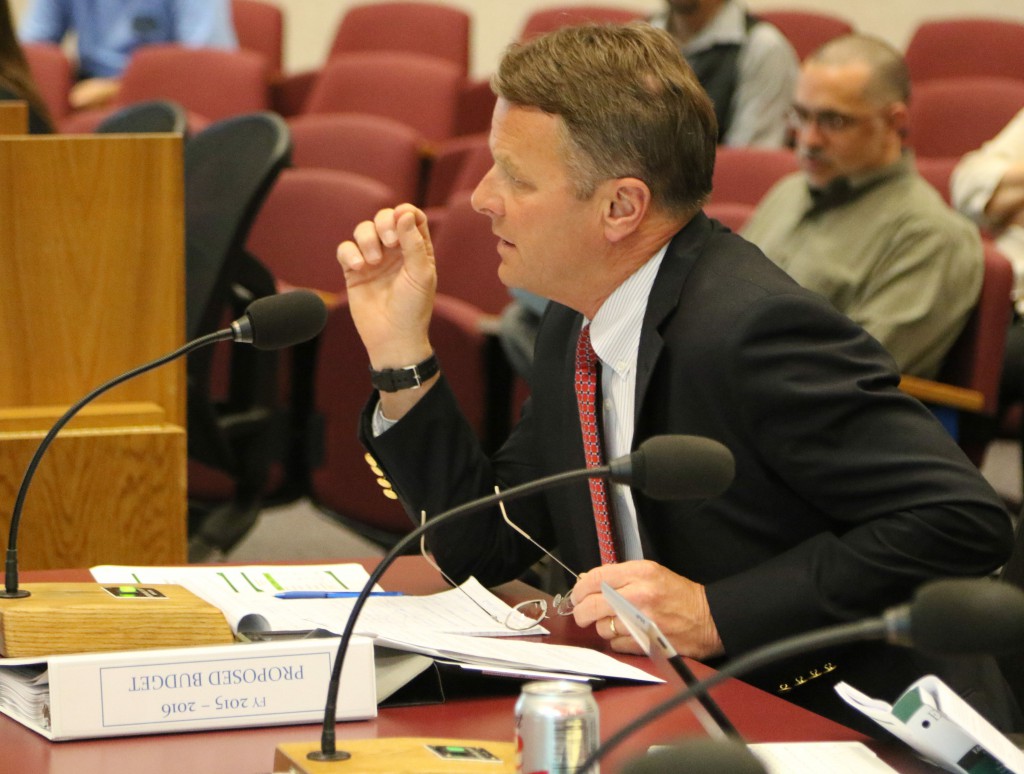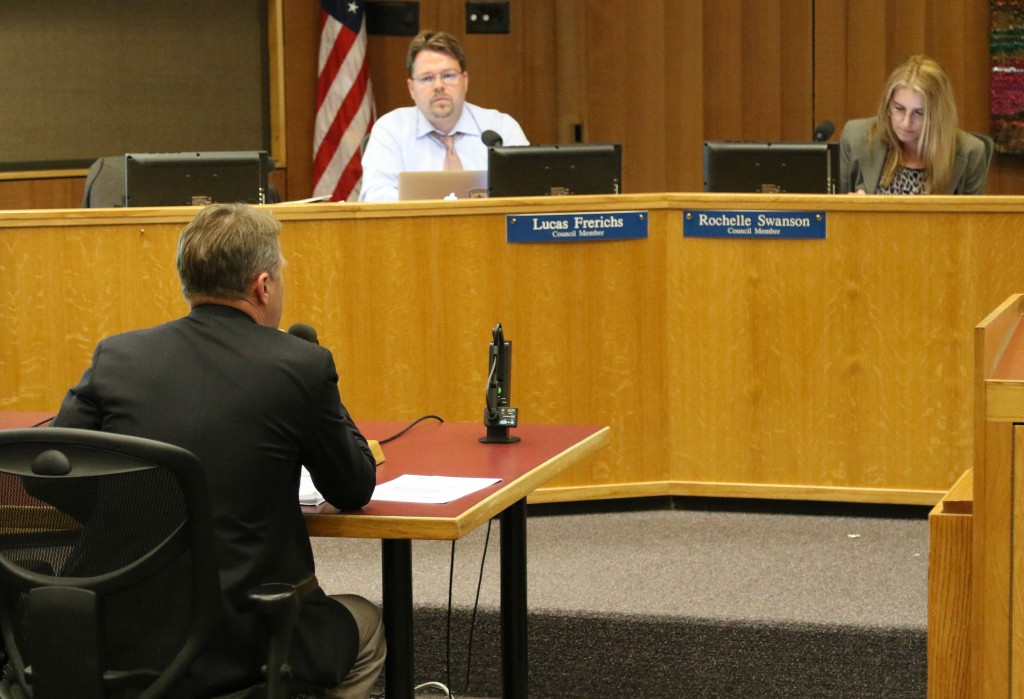

In 2014, the voters of Davis approved a sales tax measure that at the time was deemed to be “temporary” and an emergency, given the forecasts for ongoing structural deficit. The tax revenue combined with an improved fiscal forecast have improved the budget picture – leading the discussion on Tuesday to what to do with that money, looking at the reserve level and asking what happens if voters decline to renew the temporary tax in 2020.
Mayor Pro Tem Robb Davis pointed out that, despite the presentation by Bob Clarke that showed about $15 million in roads funds ready for this summer, “there’s a lot more to do because of the backlogs and maintenance of other items, parks and other items that we’re studying and we’ll know more about this fall.
“If revenues come in better than projected – Dan Carson’s sure they’re going to – that we be able to… (ask) staff to be able to look at a second level of projects that can be brought forward fairly expeditiously to be funded,” he said. “The whole idea of holding onto cash at a time when we could apply it – there may be restrictions, I understand that.
“As a principle, we mobilize those funds more in the current,” he said.
On the general fund reserve, the mayor pro tem said, “Quite frankly, I’m just going to say it, 15 percent on revenue feels like some talisman we hold out there. I don’t understand the meaning of it and I don’t know why we’re holding onto that amount of money given the needs of the community.”
He added, “I’m not asking us to be irresponsible with that money. But I am saying, given the needs, it would seem like we should be spending it now.”
Mayor Dan Wolk jumped in to say, “I just want to reinforce what Robb said and I had the same exact conversation with Dirk. I think it’s important to have that conversation, particularly showing in some of these out years the reserve climbing toward 25 percent which seems overly prudent.” He would add, “I think Robb’s correct, we have a lot of needs now.”
City Manager Dirk Brazil responded, “It’s very much a policy call on the part of the council.” The recommended range for reserve, he said, is between five and 15 percent. “There’s been consensus in the past that 15 percent is where we want to be. It’s a council decision as to what’s a good number for you. There’s communities out there that have much lower general fund revenue (reserves), the rating agencies think very highly of them, they have ways to bring the money back in if it’s needed. It’s your comfort level.”

Mr. Brazil pointed out there are two different issues, one is what level should they be at and the second is what do we do as (if) our revenues continue to grow – “do we just continue to put them back into our general fund reserve or what is it that the council would like to do – and then we get into spending priorities discussion.”
Councilmember Brett Lee brought up the fact that, while the revenues and fund balance appear to be healthy, in part they are due to the sales tax revenues which are set to expire, according to staff, after the 2020-21 Fiscal Year.
As Kelly Fletcher pointed out, “Right now we look great, but when you move into that the forecast model shows that sales tax not be renewed then we would see a very significant loss of revenue.”
She said it is about $3.7 million. However, that seems to be the revenue just for Measure O, rather than the entire one percent sales tax which would actually be likely twice that.
Councilmember Lee stated, “I’m a little concerned that we have this trajectory that we graph” where we see the 15 percent reserve over the next six years increasing up to 25 percent. He noted if the voters reject the renewal of the sales tax, “I don’t want to say we fall off a cliff, but there’s a significant drop. It just so happens to be just outside the window of the graph that we’re showing…”
He wanted to have the graph point out what happens if the sales tax is not renewed, “because it has very big implications.”
Councilmember Rochelle Swanson said, “It’s great and we’re optimistic that we’re seeing these projections.” She said, “It was fighting tooth and nail in 2010 and 2011 to be able to get our budget projection away from an expectation of three percent growth – even in the recession.”
She pointed out that, with the sales tax, “we told people that was going to be temporary to get us out of the recession.” She argued that the forecasts should have the revenues “without the sales tax so that we’re not assuming it’s going to pass.”
Ms. Swanson added, “I want to make sure that we’re taking care of the things that we promised.” She said that we should not assume that our sales tax base is going to continue on this trajectory. “It’s very cyclical so just assuming it’s going to stay forward,” she said it’s problematic. She pointed out the hit that the city took when the auto row sales taxes went flat. “We still have very few eggs in our baskets.”
Councilmember Lucas Frerichs said, “Compared to where we were, several years ago, this is a bright budget picture, certainly. I’m cautiously optimistic that we’re moving in the right direction. There is no question that we have… a whole wide range of major issues on the table ahead of us.”
He said he was encouraged by the $4 million of general fund money that the city was able to carve out for infrastructure, “but certainly that’s a drop in the bucket compared to what we need to do ultimately.”
He noted that the city is working on revenues. He expressed disappointment that one of the innovation park applicants put their application on hold. Councilmember Frerichs pointed out we need not only temporary revenue through tax measures, but another portion coming through economic development.
—David M. Greenwald reporting

Great, they talked about the revenue. Did they decide to do anything or was it all a bunch of getting nowhere talking. Where there any proposals to say use part of the reserve for road repairs. It would seem that there would be a cost savings to doing something now instead of waiting for further deterioration which will only cost more to repair.
I should have explained that they do not pass the final budget until the end of June and I believe they have three more budget discussions between now and then. This is the first salvo and I plan to have more on roads tomorrow or Friday.
BTW, I didn’t want to do a commentary, but I think fiscal hawks should be alarmed at the quick shift from temporary tax to plug the gap in our finances to talk of renewal.
My viewing of the CC last night was pretty amazing in that there was a disconnect between the rosy adjectives on the part of Dan and somewhat Lucas about the budget forecasts, etc and the reality by Robb then the perceptive pick up by Brett of the graphs not showing the end of the sales tax revenues without reissue….which brought Rochelle more into the reality camp. Pretty amazing. The elephant in the room as far as I am concerned is the MOU and contracts. So they are not figuring for any increase in employee compensation? What if the negotiations don’t go that way, then what?
The affordable housing discussion at 11pm was telling also.
No surprise there. We already know every “temporary” tax that gets proposed is just a smokescreen for a permanent tax. Many on here have said that all along when either the schools or the city propose “temporary” taxes..
Did I spell everything right? I’d hate to have our blog NNON, nattering nabob of nitpicking, have to correct me.
LOL!
By the way, it seems that spellcheck is working again on the VG for my iPad and iPhone. So is copy/paste.
LOL, there’s got to be a Mace “curb” on the Mace curve somewhere. That’s my story and I’m sticking to it.
If you leave the sales tax in the projection and allocate the money to increase fund balance then you can say that we don’t need that much future reserve and use that for employee compensation. Then when the sales tax is set to expire you tell the public the City is out of money and needs the taxes extended.
Why would you leave the revenue of an expiring “temporary” tax in a projection?
If the City is able to accumulate excess fund balance in the next few years it should be spent on one time projects, not on things that will increase the ongoing costs to run the City.
why are you even talking about extending or renewing a temporary tax?
Just to be clear on the projections and the ending of the sales tax…
It is standard procedure for staff to present 5-year projections based on stated assumptions to provide a look at where things are going as far as the General Fund is concerned. Obviously, these numbers can and do change (even dramatically) based on a variety of factors. The problem identified by Brett last evening (of which, I believe, we were all aware) is that the effect of the end of the 1% sales tax increment does not show up in the five year window. We felt it was important to alert the community that this issue will be arising and so we asked staff to prepare 7-year projections so that we can transparently share the effect of the end of the tax with the community. This seems a reasonable thing to do and also helps remind us (as do the large amounts of infrastructure backlogs we must address, and the still ever growing pension requirements) that we have much work to do to find other sources of revenue in the coming years.
Yes Robb, appreciate. Was a 5 yr projection but think important either in the graph or discussion to have mentioned the looming sales tax ending right after!
I had thought the sales tax revenue was going to drop off in FY20, not FY21. So in a five year projection you would not see the drop off. That was a good idea to request a seven year projection in this case.
Also, what you said about spending the money, if more is available, on projects is what should be done. My worry is that it will be spent on compensation, an ongoing expense.
This fall? What is taking so long?
We already have temporary revenue through tax measures. But we really don’t have any economic development.
The problem…
Say your family gets $50,000 per year, and your income drops to $40,000 over several years, but now it is $60,000. You say “yippee skippee, life is good again!”
But what you failed to mention/consider is that you have $450,000 in credit card debt and your lifestyle is causing it to increase by $25,000 every year. Instead of putting the extra $10,000 in income toward slowing the accumulation of debt, you go spend it on a new motorcycle.
Thankfully for you, you are a city and you don’t really have to report that credit card debt.
In fact, you want to update your landscaping with a ballpark for your kids, and you go out and get a loan and report the loan proceeds as extra income… just leaving off the increased debt.
I fully expect that when this report comes out in the fall, it will show that Davis has a $400 million dollar debt of unfunded long-term liabilities. City employee retirement benefits, road and infrastructure maintenance have been underfunded year after year so that politicians could paint that rosy picture of our finances to help justify the ever increasing pay and benefits to the public employee unions that in-turn fund the campaigns of the politicians.
Any increase in city revenue needs to go toward fixing our roads and repairing our infrastructure and saved for the future were CalPers inevitable mistakes in over-projecting earnings on pension fund investments will come back to haunt us.
Yeah, but we wants a pool and a ballpark . . . so best you not confuse the peoples with reality, Mr. Lee.
Frankly – It appears that you were not watching last night. If you had, you would have seen a City Council very much acknowledging the challenges you outline. So, I think we are on the same page here. EVERYTHING you raise: pensions, unfunded liabilities, backlogs–everything was part of the discussion. In addition, the staff presentation also talked about steps we are taking to build reserves for needed IT upgrades, fleet upgrades and others. The staff presentation talked about how we are dealing with PERS and OPEB based on the latest actuarial studies to prepare for the future. There was no attempt to hide the ball or paint a rosy picture.
We can be happy that things are better than they were while simultaneously calling out the continuing huge challenge ahead.
We can acknowledge the challenges while noting the steps we are taking to deal with them.
This is what was done last night.
my concern was the constant mention of “renewal” and if the voters “don’t renew the sales tax” for a measure that was supposed to be temporary.
Thanks for the reassurance Robb. But I think it justifies repeating.
People absorb good news easily and shut out bad news that is inconvenient. In consideration of this I think the balance needs to tip to reminding everyone of the bad news.
One way to frame this…
“I got a raise but it is already spent.”
Mr. Davis and Mr. Frankly, am I missing something? Here is how I see things. I believe these are facts.
1. There is a massive backlog in road work, a critical “must have” infrastructure item.
2. Prior to a “tipping point” in road degradation, a road can be repaired for a fraction of the cost of a new road; conversely, once the tipping point is past, costs skyrocket.
3. We have many roads near said tipping point.
4. We have unexpected funds now available.
5. Roads can’t effectively of efficiently be worked on in the fall or winter.
Given these facts, why not put out an RFQ ASAP for additional road work – this summer? If great prices come in, do the work. If not, take a pass. I don’t understand the dottling and “consensus building”, we are not discussing global cooling or “nice to have’s” or vanity projects or a town gateway. Instead of pandering to splinter groups, address a vital need.
Leaders were elected to lead, not doddle.
Umm… TBD, did you watch the CC meeting last night? This is what I asked for: to see if staff could move some critical projects forward given the improving fiscal situation. In fact, I went further and asked for a finer analysis of existing funds that we could use to address current needs.
Did not, I will try to. I could be wrong, but this needs to be an urgent matter with laser focus … or else we lose a whole year and a potential rise in the cost of the work (market fluctuations).
All excellent points by TrueBlueDevil.
Let’s add a couple more:
6. The cost of pavement has nose dived over the past year. Check out this link from Caltrans:
http://www.dot.ca.gov/hq/esc/oe/ac_index.html
This link will tell you that paving costs have dropped by more than half in the past year!
7. As asphalt prices were dropping last year, and revenues were coming in above projections, why wasn’t the City planning a huge surge in paving for this summer? Because you can’t wait until June on your paving plan — you have to have your bid specs ready well ahead of time. It may be too late now.
8. This is what happens when you hire a rookie as City Manager who is more focused on loyalty oaths from staff instead of immediately addressing the city’s most pressing need.
Huge opportunity lost.
Great feedback, Gunrocik. Prices hve dropped by half? Wow! I wonder if we gain any savings from any contracts we signed in advance of this summer?? Is it possible he prioritized shifting around city departments / offices over this issue? I do like some parts of the shuffle … but roads come first.
I also recall reading somewhere that the city received another few million somewhere else that was unexpected – I would do the same with that, pump it into road repair.
From my very limited knowledge the only other place I would prioritize may be reserves, but those sound solid.
I’d also consider hiring a non-union firm with American (legal) workers, but I don’t think that will fly in Davis.
Have we ever had an update on the massive supposed daily water leak at the community pools? An update would be timely given the drought.
Fiduciary Responsibility? I also never recall reading an update on the $22,000 city investigation of the volleyball coach where not one witness presented by the volleyball coach was interviewed. Someone spends $22,000 in an out-of-the-ordinary expense in my department, I will want all the details. No funny business. If this was a sham investigation, how many other city investigations were handled in a shoddy manner? A hundred thousand here, a million there, pretty soon we’re talking real money.
The leak was fixed last September.
The City investigated no volleyball coach–that would be the school district where coaches coach.
I stand corrected. Still, DJUSD needs to be careful stewards of public monies.